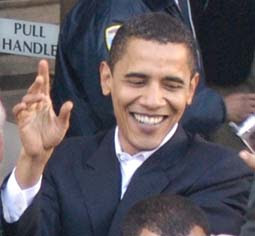
by Lisa Keen
Bay Area Reporter
Democratic presidential candidate Senator Barack Obama (D-Illinois) has come under criticism from some in the gay and AIDS communities who objected to one of his responses in a debate last week and said it contributed to the ongoing stigma of HIV/AIDS in the African American community.
Obama had just responded to the question noting how AIDS stigma had impacted the African American community, when he interjected to clarify a comment made by Senator Joe Biden (D-Delaware), who pointed out that both he and Obama had been tested for HIV.
Read the rest here.





See page 8 in the transcript
ReplyDeleteat
http://www.nytimes.com/2007/06/28/
us/politics/29transcript.html?pagewanted=8
Letter to the Editor:
ReplyDeleteIt is refreshing to hear presidential hopefuls debating strategies against HIV/AIDS (“Frank conversation at debate: Democratic hopefuls discuss AIDS threat, racial profiling”). Sen. Hillary Rodham Clinton is right to lament the lack of public attention to deadly rates of HIV/AIDS among African-American women. Sen. Barack Obama also got it right when he named homophobia as one of the reasons communities have failed to respond appropriately to the HIV/AIDS crisis. However, it’s a shame that none of the candidates mentioned that African-American men who have sex with other men are the population most severely impact with HIV/AIDS in America.
Clinton criticized the government for not addressing the disease like it did “back in the ‘90s when it was primarily a gay men’s disease.” Obama took pains to explain that he was accompanied by his wife, and not Sen. Joe Biden, when he publicly accepted HIV testing (not “AIDS testing,” as spoken by the candidates) in Africa. Both remarks are emblematic of a public discourse that all too often ignores, isolates, and stigmatizes gay and bisexual men.
Absent from the debate is the fact that HIV/AIDS still disproportionately affects gay men of all races and colors and is spreading at alarming rates among black gay and bisexual men. Tragically, 402 African-American gay men and 142 African-American women were diagnosed with HIV between 2004 and 2005 in Chicago alone. A recent study by the CDC, conducted in five major U.S. cities, found that almost half of all gay black men were HIV-positive and two in three did not know they were infected with the virus.
To address HIV/AIDS in the African American community, we must fight HIV/AIDS among all groups impacted – including women and girls, gay/bi males, transgender people, substance users, and other at-risk populations.
Sincerely,
Rev. Charles Straight
Board Member, AIDS Foundation of Chicago